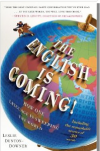

| Book of the Month | ||
 |
The English is Coming! |  |
Publisher: Touchstone
Author: L. Dunton-downer
$9.99
ISBN-13: 9781439176726
This is the first review of a book which readers can download directly once they have finished the review. Appropriately enough for a book describing a global phenomenon, it is available on a golbal medium - the internet. However, more traditional readers will be glad to know that this book is also available as a conventional printed book. While this book may help you to learn English, it will definitely help you to learn a lot about English, but above all it will tell you why you should learn English. The author's argument is that, for better or worse, English is the world's language. Her book is about how this happened, how it is still happening, and what this means for English in the future.
The ebook has basically 352 pages, though as with most ebooks this changes depending on the interface and text size. The author has chosen thirty words as examples of how english is sweeping the world, though these thirty words are often simply a literary hook on which a whole set of discussions and arguments are based. The problem with this approach is that it is hard to keep track of theme of the book as it develops, and the author does not make it any easier by a constant series of digressions, even though these are fascinating in themselves. The basic argument of the book is that English is no longer 'owned' by the English, or even by native speakers of the language elsewhere in the world. There are more English-speakers in China than in the whole of the USA. English is now the common property of the human race, and more of the human race is learning it, using it and modifying it all the time. This justifies the ungrammatical title - most English is spoken by non-native speakers, and most of these do not speak it perfectly. Get used to it.
There are a number of minor annoyances in the book. For example in the early chapters the author speaks of 'Chinese' as though it were a language, which it is not, any more than 'European' is a language. Later chapters show that the writer knows this well. There is also the assumption that the United States alone was responsible for the globalization of English. Despite a quick nod to 'British developments' the author says that the United States spread English by books, films and post-war music. Allowing film to the USA, perhaps British writers such as Dickens and Shakespeare in books and the Beatles and the Rolling Stones in music helped the process along? In short, for a book about a 'global' language, the (American) author can be remarkably parochial at times.
Who is this book for? Anyone who is interested in the development, spread and future of English will find this a thought-provoking book. It is also filled with fascinating details, anecdotes and etymologies which make it, as the cover review says 'like the best cocktail party conversation you've ever had. Every EFL library should have a copy,and the teachers will enjoy it as much as their advanced students ('advanced' because the author has an academic background, and every now and then her writing style drops into 'academicese').
Verdict: Teaches about English, rather than teaches English
Assessment 8/10